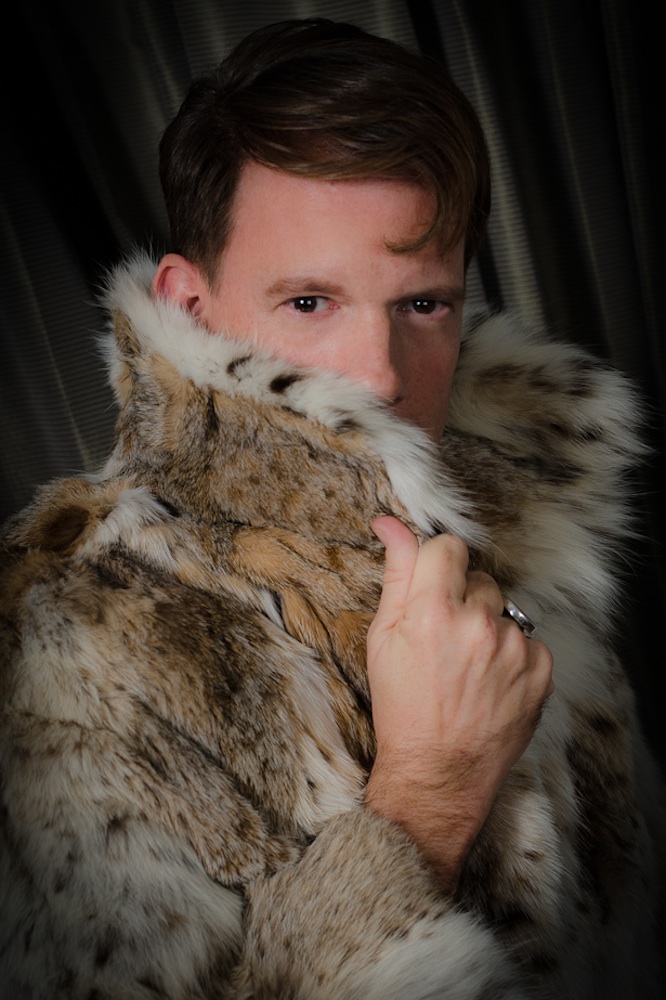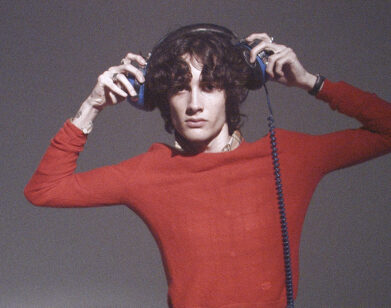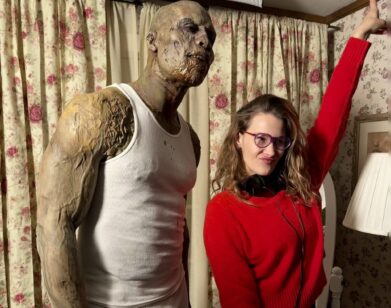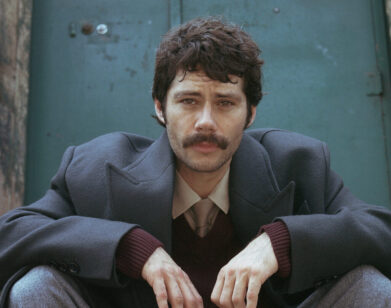Mama Dearest

ABOVE: JAMIE BRICKHOUSE
Jamie Brickhouse went from being the mama’s boy who could do no wrong to the hard-drinking sleep-about who could barely stand up. The Texas-born, Manahattan-based writer, comedian, and former publishing-house publicist had his first drink at the age of five and loved it. He had his last drink a handful of decades later—right around the time he tried to kill himself. And through it all, he answered to his domineering mother, a.k.a. Mama Jean.
The fact that Brickhouse is still around to tell his story is a wonder. The fact that he’s told it in such a compelling and funny manner—without a hint of finger-pointing at anyone but himself—is astounding. Dangerous When Wet, out this month from St. Martin’s Press, has already earned accolades from the likes of Mary Karr and Paul Rudnick. It’s a memoir as tightly constructed as a well-crafted novel and as funny as an evening with Carrie Fisher. Having said all there is to say about his booze-soaked past, Brickhouse recently spoke with us about what it was like getting it down on the page.
PATRICK RYAN: How long did Dangerous When Wet steep in your mind before you started writing it?
JAMIE BRICKHOUSE: Wouldn’t “ferment” be a better word? When I was at rehab in Palm Springs eight and a half years ago, I’d regale my rehab buddies with my booze-capades and Mama Jean stories. Because I was in publishing, they’d joke that I was going to write a book and tell all our dirt. It planted the seed, but my interior censor said, “You’ll never write a book.” In 2010, a year after Mama Jean died and after I was two years sober, I joined a writing workshop, and the first piece I wrote was about facing up to Mama Jean while drunk.
RYAN: And was there anyone you mentioned the project to early on who said, in effect, “Are you crazy? Don’t do it!”
BRICKHOUSE: Nope.
RYAN: No one at all?
BRICKHOUSE: Only me. [laughs] When I started writing, my interior censor didn’t tell me I was crazy, but it did beg the question, “Do you really want to reveal all this?” And the answer wasn’t, “I do! I want to tell it all!” The answer was, “I really want to express myself artistically, and this is the story I want to tell right now.” I wasn’t liberated to write it until two deaths had occurred: the death of my drinking and the death of Mama Jean. Once they were gone, there was no other story I wanted to tell. Both booze and Mama Jean cast long, rich, complicated, funny, sad shadows over my life. I wrote the book not as therapy but because those two relationships flowed organically from my mind onto the page.
RYAN: In your author’s note at the beginning of the memoir, you refer to your mother and alcohol as the two most dominant relationships in your life. The book is a beautiful—and scary, and sad, and often hilarious—portrait of both of those relationships. Did you ever worry that you had to focus on one and not the other?
BRICKHOUSE: Actually, I refer to them as the two most “important” relationships, but I like “dominant.” When I started writing, the stories that were burning to get out were about my alcoholism and Mama Jean. Once I had the confidence that I could maybe write a book, I thought I had to choose: either write about my relationship with Mama Jean, or about my alcoholism. But I found the two topics were inextricable; I couldn’t write about one without writing about the other.
RYAN: And the result is a memoir full of very personal stories. I gather that most of them had been uttered to loved ones and confidants at different points along the way, but I’ll bet some of them hadn’t. Out of all the things you write about in the book, what percentage—roughly—would you say had never been told to anyone before they found their way onto the page?
BRICKHOUSE: Well, some of the stories are old chestnuts of mine. Like the time Mama Jean—after I’d come out to her—asked out of the blue one day, “Have you been bare-backing lately?” Or the time I drunk-dialed Peggy Lee. Or those times I lost things: Joan Collins in Saks Fifth Avenue, my Persian lamb coat at The Rawhide, my virginity at 15, while on a family vacation in Acapulco. When I wrote, I had the task not just of retelling those stories but of making sense of them within the story arc of the book. I’m bad with numbers and percentages, but let’s say about 40 percent of the stories had never been told before. But more importantly, the feelings and emotions around those stories hadn’t been shared with anyone until I put fingers to keyboard. My suicide attempt, the chilling moment when Mama Jean accused me of drinking again after she’d lost her mind to Lewy body dementia, the day I found out I’m HIV-positive: these were stories I rarely replayed in my mind, much less told other people.
RYAN: What’s an example of an anecdote that premieres in the memoir?
BRICKHOUSE: Premiering in Chapter 22, which is called “The Bare Truth”: Finding out I’m HIV-positive. Yes, I told my partner and some close friends, but I never told anyone all the details of that day. My doctor called me at the office and gave me the news over the phone, which I think is unethical, if not a legal no-no. I was blindsided. I left work at five on the dot and went straight to a gay bar, got drunk, told a complete stranger my news as I wailed like Lucille Ball, and then had sex with that stranger at a porno bookstore around the corner. It was then that I truly understood what Blanche Dubois meant about always depending upon the kindness of strangers.
RYAN: Were you nervous about diving into the story?
BRICKHOUSE: I wasn’t nervous so much as afraid. Afraid that I wouldn’t be able to tell it well. Afraid that I’d reveal more than I should. Afraid that I’d betray the memory of my mother. Afraid that my partner and my family, especially my father, wouldn’t like it. Despite those fears, I told it anyway.
RYAN: One condition that can afflict memoirs is that a lot of writers can’t resist writing their childhood into the story, when what most of us are interested in is the grown-up stuff. But there are plenty of chapters in your book that focus on your childhood, and they all feel crucial to the greater story. There are quite a few moments that focus on booze, in fact—your childhood consumption of it. What was it about the taste of alcohol that appealed to little Jamie?
BRICKHOUSE: That’s an easy one. From the time I was five, I wanted what I saw at my parents’ parties and in movies and TV shows. My idea of heaven was to have a drink in one hand, a cigarette in the other, and my head thrown back in laughter. Everything outside of that was filler. I wanted to be an adult, and I saw drinking as the fast track to grownup-hood. Around this time I had my first sip of alcohol from my father’s whiskey. It was startling, mind-altering, and so refreshing. It tasted like being an adult.
RYAN: One of the most haunting moments in the book comes at the end of a New Year’s Eve party you and your partner have hosted. The party is over, all the guests are gone, your partner is asleep, and you’re sitting up alone for one last round of nightcaps. “I still wanted more,” you write. “I felt like Peggy at the circus. I had the feeling that something was missing. And I didn’t know what.” Can you shed a little light on that?
BRICKHOUSE: I’m referring to Peggy Lee in the existential crisis song, “Is That All There Is?” I’ve loved that song since I was five. And after that New Year’s Eve party—actually, after many parties—I listened to it over and over and over. Those moments came long before I even considered getting sober, but my headfirst dive into epicurean and hedonistic delights was starting to fray the fabric of the rest of my life. Those “is that all there is” moments were the unidentifiable indicators that what I thought would make me happy was killing me.
RYAN: And what was the “something” that was missing?
BRICKHOUSE: Substance.
RYAN: Anything missing today?
BRICKHOUSE: My youth and a pile of money. Oh, and that Persian lamb coat. [laughs] Other than those three things, I am elated, satisfied, and happy to be right where I am right now.
RYAN: What was more important to you, recreating scenes from your life or making sense of those scenes?
BRICKHOUSE: Making sense of those scenes. Reconstructing my stories with accuracy, verisimilitude, and flair was certainly hard work, but the bigger task was making sense of my history, how those scenes connected to the meaning of my life and the story I was telling. Often the revelation was in the writing. For example, I had been telling for years the Mama Jean story where she panicked—in 1987, right after I came out to her—when I told her I was dating a ballet dancer from New York City, and in response to my “Have you ever heard of safe sex?” she cried, “There are only two kinds of sex, oral and anal!” Completely forgetting vaginal. When dining out on that story, I had never bothered to think about why she reacted that way. When recreating the scene, I realized she was terrified that her 19-year-old baby would get AIDS.
RYAN: What’s your response to some readers who might cry, “TMI!”?
BRICKHOUSE: I’m sick of the term TMI. To me, when writing honestly there is no such thing as TMI, unless you’re talking about your favorite brand of fabric softener or relaying a blow-by-blow description of an airport delay. That’s TMI. When people ask me if the book is too much a warts-and-all memoir, I answer that no detail or story included in the book is gratuitous, sensational, or merely entertaining. If it was important to the story, it stayed. If not, onto the cutting room floor it went. Revealing my HIV status was the last meaty nugget of information I wrestled with sharing. I almost didn’t include it, but it’s absolutely essential to the story because I became positive as a result of my boozing and I never told Mama Jean because it was one of her biggest fears. The book is, in part, my coming out of the HIV closet, and I’m grateful for that. If a person goes through the hell of alcoholism, lives to tell the story, and that story can help another person, then there is no such thing as TMI.
RYAN: You lost your mom before you started writing the book. And when you and I first talked about it, you had just sold the book and were on your way to show it to your father, who has since passed away. What was his reaction?
BRICKHOUSE: That’s right. I remember telling you that at a party. Actually, I had just finished the first round of edits on the book. I’m bereft that he’s not here for the book’s publication. He was so excited and proud. “Hurry up and finish. I want it to come out before I die!” was his constant refrain as I wrote it. However, I was drenched in fear and dread about how he’d react to the darkest parts of the book and my sexual shenanigans. I seriously considered not letting him read it until right before publication. But I put on my big girl panties and delivered the manuscript to him in person last Easter.
RYAN: Don’t tell me you watched him read it.
BRICKHOUSE: Better than that. I sat on his lap and made him read to me. [laughs] No, I held my breath in the other room and listened as the manuscript pages fell onto the floor around his chair. He guffawed, gasped, cried. Finally, he called me in and told me he loved the book, that I write beautifully, that he was proud of me. Then he said, “Are you happy with it?” After a beat, I answered yes. And it wasn’t until that moment that I was happy with it. He died eight months later on New Year’s Eve. I’m eternally grateful that I didn’t take the coward’s road and wait to let him read it.
RYAN: And what’s your best estimation of Mama Jean’s reaction, if she had lived to read the memoir? Would it be eye opening for her? Or would she already have intuited it all?
BRICKHOUSE: Since so much of the book is about my relationship with her, and so much of it is about her, period, I think she would approve. I never could have written the book if she were still alive, but she always wanted me to be a writer so I think she would ultimately accept that this is the book I had to write first. She was a realist and a truth-teller. She never had a thought that she didn’t speak. Even though she may have been uncomfortable with some of the stories I tell, I know she would say, “But that’s the truth! That’s the way it was!” Ultimately, I think she’d be happy and outrageously proud.
RYAN: Do you envision Dangerous When Wet as a movie?
BRICKHOUSE: You better believe it! I see it as a gay Terms of Endearment with the darkly comedic debauchery of Bad Santa. It would also make a great TV series. Hollywood, are you listening?
RYAN: I hope they are. But who would play you? And more importantly, who would play Mama Jean?
BRICKHOUSE: Benedict Cumberbatch or Eddie Redmayne, for me. They’re the real reason I want Dangerous When Wet to be made into a movie—I can finally be good looking and hot. If you start Mama Jean from her mid-30s when I was born, Christina Hendricks in a brunette bouffant has the ‘tude, and she is so delicious. If you start Mama Jean from her fifties on up, Meryl Streep. Actually, I’d like Meryl Streep to play both Mama Jean and me.
RYAN: If anyone could do it, Streep could. One last question: What’s the scariest thing about having written this very personal book?
BRICKHOUSE: I think, it’s the same fear that any writer faces: that his book will fail as a work of art and that “they” will make fun of him. But at this point, I’m happy with the book I’ve written and I stand by every word.
DANGEROUS WHEN WET IS OUT NOW VIA ST. MARTINS PRESS.






